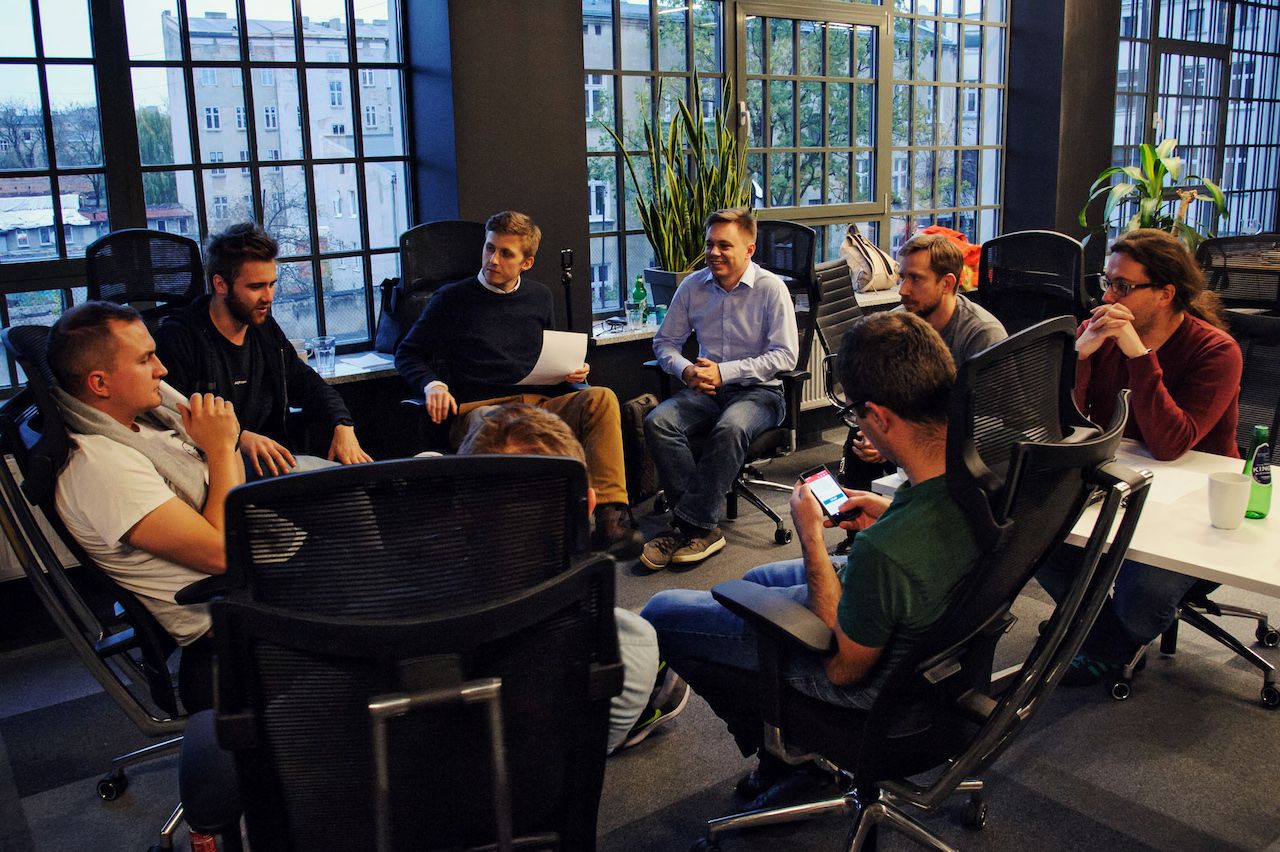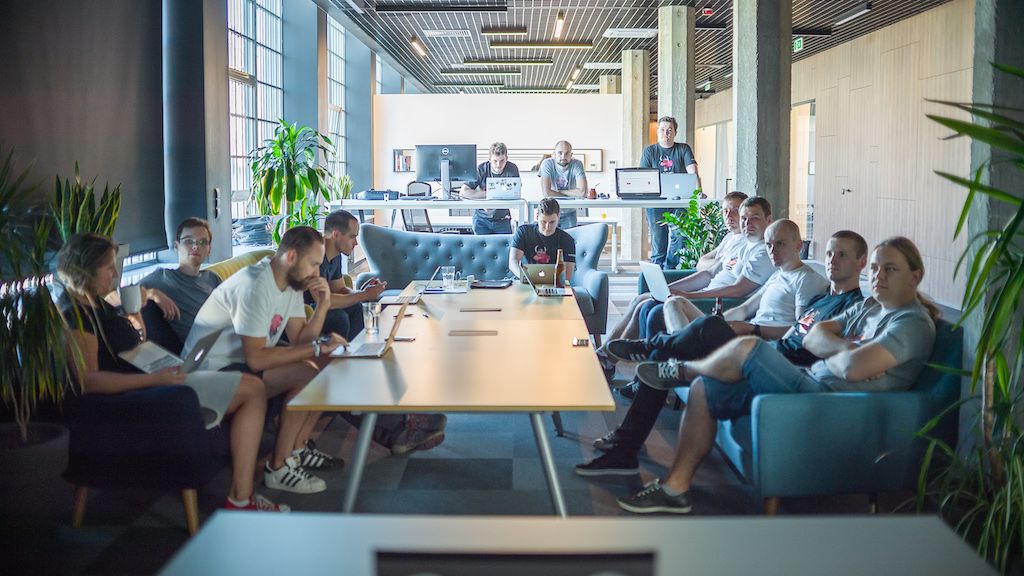Why startup founders have a hard time building remote companies?

Over the years, I’ve collaborated with dozens of successful European startup founders. Many of them weren’t interested in building remote companies.
On the other hand, Ragnarson was often (at least at the beginning of those projects) the only technical team responsible for building the product. This meant that an important “part of the company” was actually remote.
In many situations, this setup lasted for years.
If it is possible and beneficial to have an IT team working remotely, why is it more difficult to do the same in other parts of the organization? Why is it hard to work remotely by default and have the entire organization work this way?
What startups need?
Before we analyze the obstacles to working remotely, let’s have a look at what startups need in order to succeed in the long run.
Speed
Speed is one of the most commonly mentioned attributes of a successful startup. In many cases, the future market leader is not one with the best product, but one able to penetrate the market first.
Being agile
Even though speed is crucial, it doesn’t mean that a startup’s product can be a piece of crap. The team needs to constantly refine its understanding of what customers need and be able to quickly reflect it in the product. In practical terms, it means that priorities and/or the look and feel of features might change every week.
We can simply describe that as the ability to act fast on feedback.
Short feedback loops

If you operate with a significant amount of uncertainty, you need to release your work as often as possible. It gives you faster feedback from customers and a chance to focus more on what matters.
It is also relevant internally within your team. If your team members spend too much time on something without showing their work, it’s possible that what they do is not relevant and your team is losing precious time.
In essence, short feedback loops is another aspect of fast execution.
Control
There are a billion ways a startup can fail.
Lack of market need, lack of cash, lack of skills, or building the wrong thing are just a few of them.
As a startup founder, you want to focus on essentials. You want to limit the number of things that can go wrong and do your best in areas you can control.
Experimentation with the core product is essential. Experimentation with everything else is secondary, and might bring unnecessary disadvantages and problems.
Control is king. Trying to assume too much of it over non-vital things is an unnecessary risk.
Why is remote work so hard
If we look at what startups need and remote work, we find a gap. Here are the most common obstacles I see among my clients.
Limited experience
Most founders have limited experience with remote work. It usually consists of working with clients remotely or working on Fridays from home. It’s a completely different challenge to organize your entire company as a remote one.
It’s not always clear for founders what kind of systems need to be in place to make sure that their primary concerns of speed, being agile, or having maximum control are not at risk. The benefits of remote work are also more difficult to comprehend when we talk about them as opposed to experiencing them in reality.
In my experience, this problem boils down to a mindset problem. If we are familiar with something that usually works (office work), why should we change that and risk experiencing a new set of problems and uncertainties (remote work)?
To sum up, you don’t do it because you never had a meaningful chance to become familiar with it.
Diminished control
“Move fast and break things” is one of the most famous quotes from Mark Zuckerberg. It’s also one of the commonly recognized values of the Silicon Valley tech culture.
How do you expect to “move fast” without an absolute control over the steering wheel?
You don’t.
This is why you tend to do whatever you believe may increase your control.
If you want to “move fast,” you typically imagine a room of people who quickly discuss what needs to be done and collaborate hand in hand, usually sitting close to each other. The overhead of communication is low and, as long as the team is small, it’s usually a quite productive setting.
Remote work is, on the other hand, counterintuitive. It’s harder to grasp how such a communication overhead can help in increasing speed and control. Moreover, remote work isn’t a silver bullet. There are actually cases when it doesn’t bring many positive contributions.
You’re definitely not in the business of losing control. This is why you stay away from remote work.
Impoverished communication
Human communication is complex and rich in signals. Oftentimes, it’s more about what you see than what others tell you. With the growth of video conferencing, it becomes easier to imitate in-person communication remotely. It’s quite intuitive to most people to sense that it’s still not the same thing and important signals are lost in translation.
Apart from peer-to-peer everyday communication, there’s a problem of alignment in organizations. People need to have clarity about the direction to be able to push forward. Once everyone is working remotely, we severely limit the number of informal interactions that are often essential for knowledge exchange.
Communication among the team and team alignment contribute to fast execution. You don’t want to screw it with a poor and untested setup.
Impoverished team bonding

Putting a bunch of people together doesn’t automatically lead to productive and valuable work. We need to make sure these people understand and trust each other. In the long run, it’s also important to create an environment they simply enjoy.
The key to it are relationships.
Poor communication plays against developing healthy relationships and trust. How do I bond with people without social interactions, gossiping, or an occasional beer (or six)?
From the founder’s perspective, how do I build a long-lasting team that acts as one, with limited control, limited communication, and without a system in place to overcome those issues? This is simply hard and not obvious.
Bridging the gap
I don’t believe that the answer to all the concerns we mentioned is a simple one. It’s not a matter of “using a cloud solution” and switching to Slack and Zoom.
Tools are important but they’re also secondary.
Let’s focus on the essentials. If remote work requires effort to implement and increases the risk, why should you bother at all?
Business survival
Remote work has been getting traction over the years [1]. Moreover, the COVID-19 pandemic[2] forced many businesses to switch to work from home almost overnight. If we think about remote work in the long run, every business should be asking itself not only about the benefits but rather how important work from home is for survival.
In my experience, remote work is not merely a way to source talent from different regions or build a more flexible working environment. For Ragnarson, remote work is a unique value proposition (UVP) and often acts as a strong differentiator among our competitors. It allows us to attract more diverse and, on average, more skilled talent.
Here are a few important questions you should ask yourself:
- If the future were to be remote, would you be a part of it or would you slowly move towards extinction?
- Can remote work become a UVP of your business?[3]
- Can you reap the benefits before everyone else starts offering the same?
If those concerns resonate with you, it might be a good time to reevaluate your thinking about remote work.
Control
What if I told you that your ability to influence the course of your company doesn’t come from direct day-to-day instructions for your team?
People don’t do what you tell them to do. They do what makes sense in their context and according to their worldview.
Moreover, having people in the same room, apart from becoming impractical once the team grows, is an illusion of control. It gives us a certain perception of it, which isn’t real.
The real influence you have is indirect.
Your power lies in finding the right people and immersing them in the right culture.
You’re not able to control the team by steering every individual. You can, however, create an environment where people are more likely to make good decisions under little supervision.
You still need to set an example for others, mentor them, and provide support to the team. This has, however, nothing to do with exerting control by giving direct orders to people sitting in the same room.
Remote work doesn’t influence your control. Your leadership style and the team’s values do.
Communication
In organizations and other social groups, there are usually two types of communication. The formal and official one that takes place during scheduled meetings and includes everyone. The informal one, loosely held and happening “behind the scenes” where people can spontaneously share their opinions, exchange knowledge, and gossip in smaller groups.
Both of them are important ways of gathering information and help in understanding what is really going on.
With remote work, informal communication is diminished. People don’t have many occasions to gossip in the kitchen or have a quick chat before leaving the office.
There are two ways to counterbalance this negative effect:
- Be transparent by default
- Encourage informal interactions
Being transparent means many things. For me, the biggest sin is sharing only what people need to know at the time. This is usually what happens during formal meetings. As managers, we spare people from the complexity of different decisions, information that gives us an edge, or simply from an inconvenient truth. The more you limit the information flow, the harder it gets for everyone else to help you.
The second important ingredient are informal interactions. In a typical office setting, they happen without planning and effort. You go to the kitchen, someone happens to be there and you chat briefly. Remote work requires a bit more preparation. In our case, it’s a system of calls that fulfil different purposes. Many of them are peer-to-peer and encourage small talk. Our official communication style is also more relaxed and sets an example for others in their communication style.
I believe that remote work isn’t actually the main reason behind communication issues. It’s our tendency “to protect” ourselves by limiting the amount of information we share. Everything else is relatively easy to improve and doesn’t require sophisticated solutions.
Team bonding

If trust is a prerequisite of efficient and healthy teams, how do we build it remotely?
I believe that in-person interactions are tremendously helpful here. However, they also require deliberate effort. You may work from the office every day and still have a low level of trust within your team.
Still, my personal preference is to bond with the team over regular off-site meetings and meetings with our clients. I believe it’s still possible, at least to some degree, to do it online. The COVID-19 lockdown is forcing us all to do so anyway.
Remote work isn’t the biggest obstacle for team bonding. It’s the lack of a proper culture and processes.
Adaptation
There’s still an important piece missing to help you with changing your organization.
The change of your mindset.
I’m sure that you’re already familiar with the benefits of remote work and you know most of the tools. But you might still be occupied with different business priorities and a bit afraid to get started.
I absolutely feel you. I had the same concerns before we transformed Ragnarson into a self-managed, transparent company.
For me, the change of my mindset came from two sources: a financial crisis and the intrinsic need for creating a better work environment than the one offered by the old structures.
It’s impossible for me to tell what could be your tipping point or whether you even need one.
Look at it from a different perspective. Whether it’s remote work or some other bigger challenge, the world is constantly changing. “It takes all the running you can do, to keep in the same place.”[4]
If you don’t stay flexible and adapt to the changing environment, you’ll eventually become obsolete. Adaptation might be your only competitive advantage in the long run.
Conclusion
We have taken a look at the most commonly desired attributes of startups like speed, being agile, short feedback loops, and control. Each of them, in combination with typical concerns of founders regarding remote work, make remote work undesirable.
When we took a closer look at those problems, we saw that remote work is rarely a limiting force. Poor company culture, the lack of transparency, the lack of even the simplest processes improving communication and team bonding play a much larger role.
On top of that, founders need to possess sufficient leadership skills, be able to adapt, and constantly reevaluate how well their organizations are prepared for the future.
Remote work is just a way of doing things in the same way as work at the office. Both can function well as long as the groundwork on top of which they rely is well laid. I’d argue that most problems with remote work are simply the manifestation of the underlying problems in your company foundation.
Remote work doesn’t have to affect your startup negatively. On the contrary, it can help to uncover your organization’s deeper shortcomings. Strengthening the foundation brings positive and long-lasting impact on organizations.
If I were to leave you with one thing to think about, I would focus your attention on yourself.
- What are the things holding me off remote work or some other big change?
- Is it my lack of confidence in pulling it off?
- Is it the fear of failure?
- When will I be ready?
- What happens if I never am?
There is rarely an irreversible damage you can cause. Go and try it for yourself before it's too late.
Notes
[1] For more information, have a look at Gallup poll from 2017 and US Census data from 2018.
[2] COVID-19 pandemic.
[3] Have a look at Buffer’s survey about what is important to remote workers.
[4] More about The Red Queen Effect can be found on Farnam Street.
